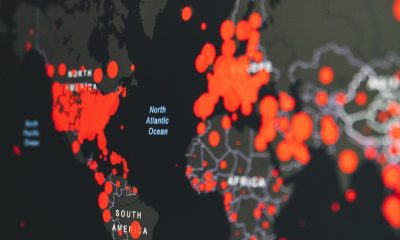Surge in rocket launches, space tourism could damage ozone layer
Rocket launches emit both gases and particles harmful to the ozone layer.
Published
1 year ago onBy
Talker News
By James Gamble via SWNS
A surge in rocket launches coupled with the rise in space tourism could substantially damage Earth's recovering ozone layer, warns a new study.
Researchers in New Zealand suggests that the more steps we take to leave Earth and explore outer space, the further we irrevocably damage our home planet.
Though the Earth's ozone layer is currently on the mend following severe damage done by humanity in the 1980s and 90s, scientists say an increase in the number of rockets launched as the space industry develops has the potential to reverse any recovery.
Rocket launches - the number of which has more than doubled in the past five years - emit both gases and particles that damage our protective ozone layer.
Around 70 countries now have space agencies and private space companies are also becoming more common.
Scientists say the “billionaire space race” – led by Richard Branson’s Virgin Galactic, Elon Musk’s SpaceX and Jeff Bezos’ Blue Origin – is pushing satellite and space tourism initiatives that “suggest an upwards trend in global launch totals."
And although their current impact on the ozone is thought to be small, a continual upsurge in space programs from leading nations could see that damage become far more significant.
Researchers from the University of Canterbury (UC), in the city of Christchurch on New Zealand's South Island, reviewed current data from rocket launches and applied it to future estimations of the upsurge in space travel.
Annual launches across the globe grew from 90 to 190 in just the past five years - with most of these occurring in the Northern Hemisphere - and the global space industry is predicted to grow to upwards of $3.7 trillion (£3.072 trillion) by 2040.
But despite the fervor of billionaires such as Elon Musk and Richard Branson for scientific voyages and discovery, scientists argue launches need to be balanced and measured with their impact on our environment.
The ozone layer forms a layer of the Earth's stratosphere, at an altitude of around 10km (6.2 miles), which contains a high concentration of ozone.
It absorbs and protects the Earth from harmful ultraviolet radiation from the sun.
The protective layer was severely damaged in the 1980s and 90s due to the use of chlorofluorocarbons; chemicals used in aerosols and refrigeration.
However, thanks to coordinated action and legislation implemented across the globe, the ozone layer is now on track to fully heal by the end of the century.
Rocket launches emit both gases and particles harmful to the ozone layer; such as reactive chlorine, black carbon and nitrogen oxides - whilst new fuels such as methane are yet to be measured.
Dr. Laura Revell, an Associate Professor in Environmental Physics at UC, says the launches have the potential to do more damage as they increase in frequency.
She explained: "The current impact of rocket launches on the ozone layer is estimated to be small but has the potential to grow as companies and nations scale up their space programs.
"Ozone recovery has been a global success story. We want to ensure that future rocket launches continue that sustainable recovery."

Planetary scientist and UC senior lecturer, Dr. Michele Bannister, adds: "Rockets are a perfect example of a ‘charismatic technology.'
"The promise of what the technology can enable drives deep emotional investment – extending far beyond what the technology also affects."
The New Zealand review also acknowledges the huge part the country, also known by the Maori name Aotearoa, could have to play as a leader in the space industry.
UC Master’s student Tyler Brown, who was involved in the research, said: "New Zealand’s role as a major player in the global launch industry means we can help steer the conversation.
"We stand to benefit enormously from additional growth in our domestic space industry, and with that comes the opportunity to ensure that global activities are sustainable for the planet as a whole."
The study, published in the Journal of the Royal Society of New Zealand, includes detailed plans of action for both companies in the space industry and the ozone research community.
These include the suggestion for companies to measure the emissions of launch vehicles on the test stand and in-situ during flight, making that data available to researchers, and putting effects on the ozone into industry rocket design and development.

Dr. Revell said: "The international ozone research community has a strong history of measuring atmospheric ozone and developing models to understand how human activities could impact this critical layer of our atmosphere.
"By working with launch providers, we are well-placed to figure out what impacts we might see."
Dr. Bannister added this was an opportunity for the industry to get 'ahead of the game.'
"Rockets have exciting potential to enable industrial-level access to near-Earth space, and exploration throughout the Solar System," Dr. Bannister said.
"Creating sustainable global rocket launches is going to take coordination across aerospace companies, scientists, and governments: it is achievable, but we need to start now.
“This is our chance to get ahead of the game."
Stories and infographics by ‘Talker Research’ are available to download & ready to use. Stories and videos by ‘Talker News’ are managed by SWNS. To license content for editorial or commercial use and to see the full scope of SWNS content, please email [email protected] or submit an inquiry via our contact form.
You may like


Scientists estimate as much as 11M tons of plastic sitting on ocean floor


Scientists say this disease most likely to cause next global pandemic


Study finds longest recorded COVID infection lasted nearly two years


Scientists create family tree of coffee for clues to resist climate change


Tiny ingestible beads could help fight liver disease: study


Regular exercise can greatly reduce risk of cardiovascular disease: study
Other Stories


John Lennon’s lost ‘Help!’ guitar to break auction records
The iconic guitar is expected to fetch between $600,000 and $800,000.


Scientists clone two black-footed ferrets to save endangered species
The black-footed ferret is one of North America’s most endangered mammals.


Flight attendant reveals her top flight and travel tips
She has been a flight attendant for six years and traveled to 44 countries on thousands of flights.


How much is tipflation costing Americans every year?
Americans are spending much more on tipping than they want to.


Majority of American moms and dads feel lonely and burned out
And over 60% say they are burned out by their responsibilities as a parent.
Top Talkers

 Parenting6 days ago
Parenting6 days agoSingle mom details struggles of feeding her 12 kids

 Lifestyle5 days ago
Lifestyle5 days agoWoman regrets her tattoo nightmare: ‘It’s horrendous’

 Broadcast1 week ago
Broadcast1 week agoOver 40% of Americans have no clue what a 401k is

 Broadcast7 days ago
Broadcast7 days agoHow hard is it for Americans to live sustainably?

 Good News1 day ago
Good News1 day agoDisabled student takes first steps in 10 years on graduation stage

 Money1 week ago
Money1 week agoOver 40% of Americans have no clue what a 401k is

 Environment7 days ago
Environment7 days agoHow hard is it for Americans to live sustainably?

 Pets1 week ago
Pets1 week agoMost cat owners know very little about their feline friends
